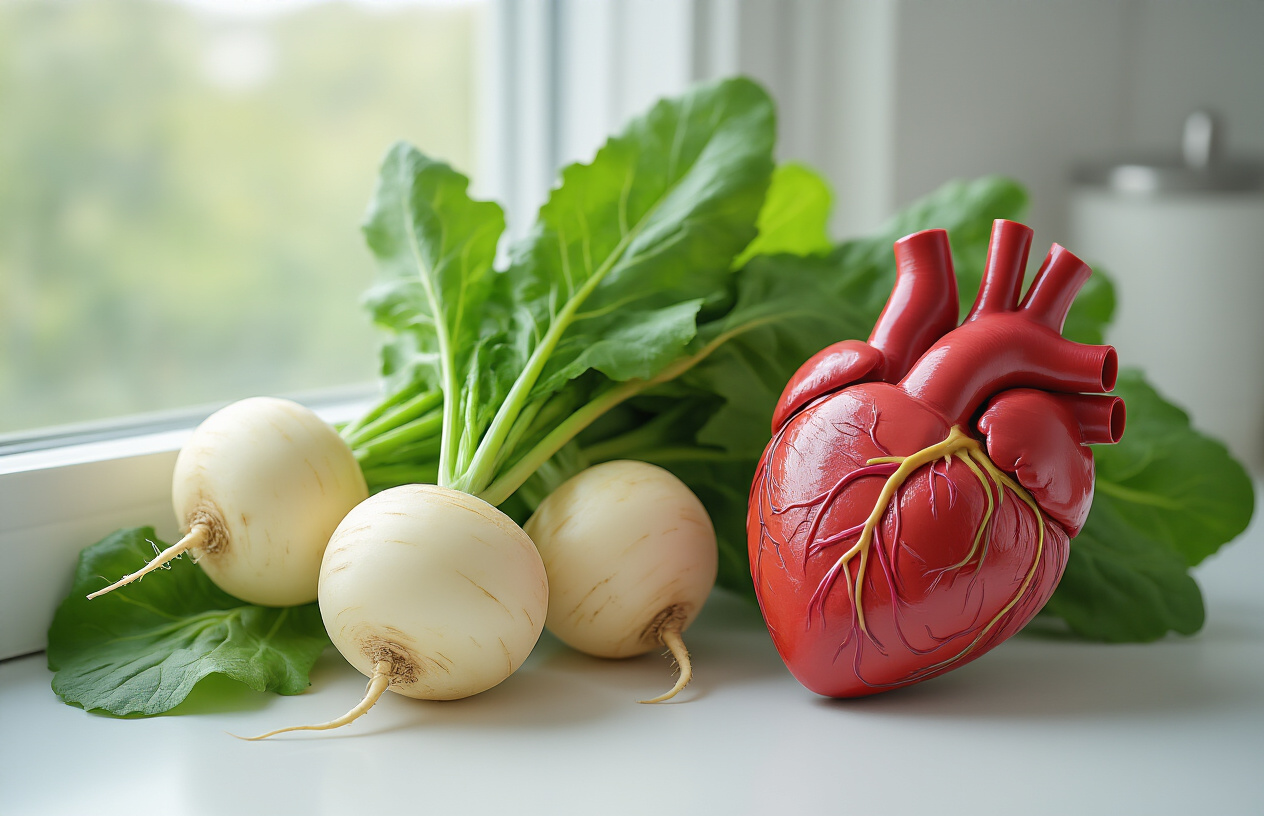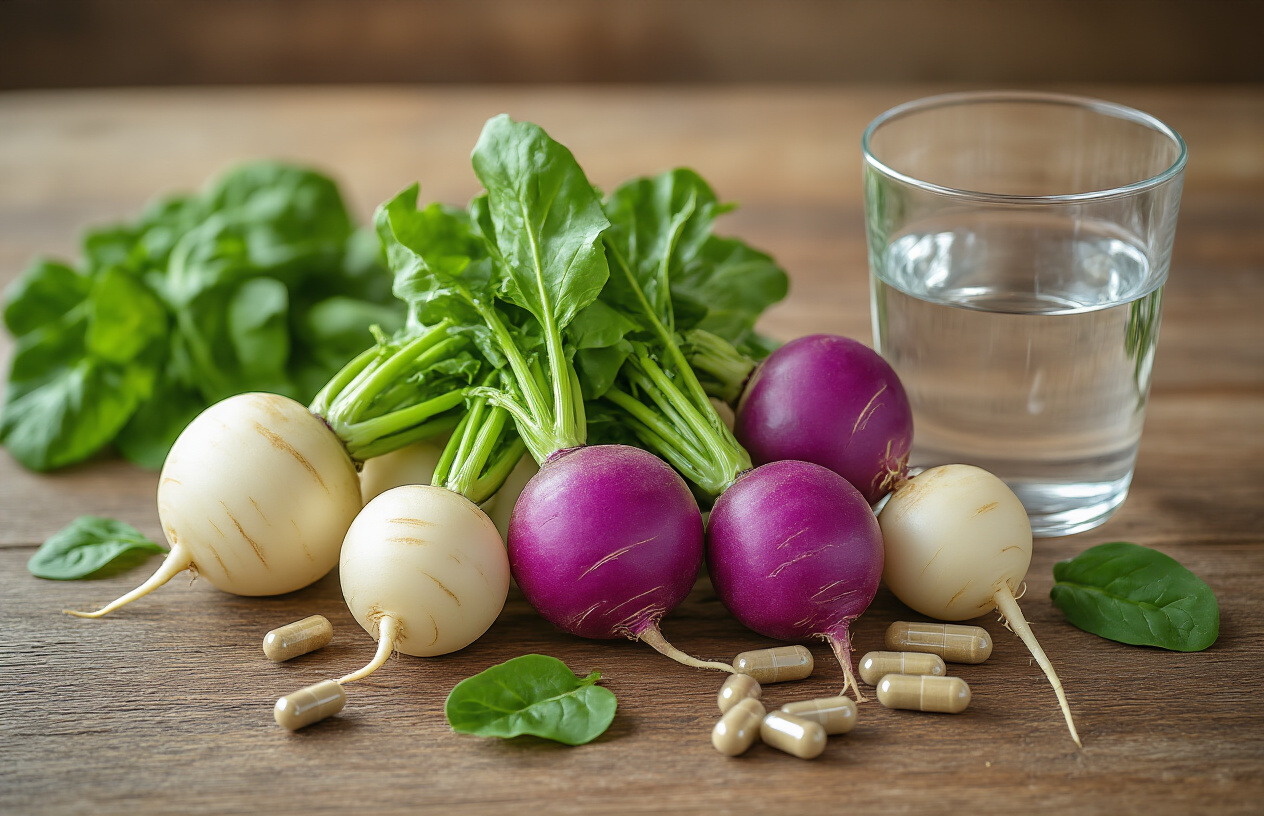Turnips pack serious nutritional punch that most people completely overlook. This humble root vegetable deserves a spot on every health-conscious person’s plate, from busy parents seeking nutrient-dense meals for their families to fitness enthusiasts wanting to maximize their dietary benefits.
These white and purple gems offer way more than their mild flavor suggests. We’ll explore how turnips boost your cardiovascular health through their unique combination of potassium and nitrates, plus dive into their impressive immune-supporting properties thanks to high vitamin C content. You’ll also discover how turnips help optimize your digestive system with their fiber content and natural compounds that support gut health.
Nutritional Powerhouse for Optimal Health

Rich Source of Essential Vitamins and Minerals
Turnips pack an impressive nutritional punch that rivals many popular superfoods. These humble root vegetables deliver substantial amounts of vitamin C, with just one cup providing nearly half of your daily requirement. This vitamin C content supports collagen production and helps your body absorb iron more effectively.
The vitamin K content in turnips stands out as particularly noteworthy, contributing to proper blood clotting and bone metabolism. You’ll also find meaningful amounts of folate, essential for DNA synthesis and red blood cell formation. The mineral profile includes potassium for heart health and blood pressure regulation, plus calcium and magnesium that work together to maintain strong bones.
Turnip greens deserve special mention, as they contain even higher concentrations of vitamins A, C, and K compared to the roots. These leafy tops also provide lutein and zeaxanthin, carotenoids that protect eye health and may reduce the risk of age-related macular degeneration.
High Fiber Content for Digestive Wellness
The fiber content in turnips makes them exceptional allies for digestive health. A single cup contains approximately 3.1 grams of dietary fiber, which represents about 12% of the recommended daily intake. This fiber comes in both soluble and insoluble forms, each serving distinct digestive functions.
Soluble fiber acts like a gel in your digestive system, slowing down digestion and helping stabilize blood sugar levels. This type of fiber also feeds beneficial gut bacteria, promoting a healthy microbiome that supports overall immune function and mental well-being.
Insoluble fiber adds bulk to stool and helps food move through your digestive tract more efficiently. This prevents constipation and reduces the risk of developing hemorrhoids or diverticular disease. Regular consumption of fiber-rich foods like turnips can also help reduce cholesterol levels and decrease the risk of colon cancer.
Low Calorie Density for Weight Management
Turnips excel as a weight-friendly food choice, containing only 36 calories per cup while delivering substantial nutritional value. This low calorie density means you can eat satisfying portions without compromising your weight management goals.
The high water content in turnips adds volume to meals without adding calories, helping you feel full and satisfied. This natural appetite control makes turnips an excellent substitute for higher-calorie starches like potatoes or rice in many recipes.
| Food Item | Calories per Cup | Fiber (g) | Water Content |
|---|---|---|---|
| Turnips | 36 | 3.1 | 94% |
| Potatoes | 134 | 3.8 | 79% |
| Rice | 205 | 0.6 | 68% |
The combination of fiber, water, and nutrients creates a perfect storm for healthy weight management. You get the satisfaction of eating substantial portions while maintaining a caloric deficit necessary for weight loss or maintenance.
Antioxidant Properties Combat Free Radicals
Turnips contain a diverse array of antioxidants that protect your cells from oxidative stress and inflammation. The glucosinolates found in turnips break down into compounds called isothiocyanates, which have been studied for their anti-cancer properties and ability to neutralize harmful free radicals.
Beta-carotene gives turnips their subtle color and converts to vitamin A in your body, supporting immune function and eye health. The anthocyanins present in purple-top turnip varieties provide additional antioxidant power and may help reduce inflammation markers in the blood.
Vitamin C acts as a powerful water-soluble antioxidant, protecting cellular membranes and supporting the regeneration of other antioxidants like vitamin E. The selenium content in turnips, though modest, contributes to the body’s antioxidant enzyme systems.
These antioxidants work synergistically to reduce cellular damage that can lead to chronic diseases like heart disease, diabetes, and certain cancers. Regular consumption of antioxidant-rich foods like turnips helps maintain cellular health and may slow the aging process at the molecular level.
Cardiovascular Health Enhancement

Natural Blood Pressure Regulation
Turnips pack a powerful punch when it comes to keeping your blood pressure in check. These humble root vegetables contain impressive amounts of potassium, a mineral that acts like a natural counterbalance to sodium in your body. When you eat turnips regularly, the potassium helps your blood vessels relax and widen, reducing the strain on your cardiovascular system.
The nitrates found in turnips work behind the scenes to boost nitric oxide production in your body. This process helps your blood vessels stay flexible and responsive, making it easier for your heart to pump blood efficiently. Studies show that people who eat nitrate-rich vegetables like turnips often see noticeable improvements in their blood pressure readings within just a few weeks.
What makes turnips especially valuable is their low sodium content combined with high water content. This combination helps your kidneys flush out excess sodium more effectively, preventing the water retention that can spike blood pressure levels.
Cholesterol Level Management
The fiber content in turnips plays a starring role in managing cholesterol levels naturally. Both the root and leafy greens contain soluble fiber that binds to cholesterol particles in your digestive system, preventing them from being absorbed into your bloodstream. This process helps lower your overall cholesterol numbers without medication.
Turnip greens deserve special attention here. They’re loaded with compounds called glucosinolates, which your body converts into beneficial substances that help regulate cholesterol production in your liver. These compounds work by influencing the enzymes responsible for cholesterol synthesis, helping maintain healthier levels naturally.
The antioxidants in turnips, particularly vitamin C and beta-carotene, protect your existing cholesterol from oxidation. Oxidized cholesterol is the type that sticks to artery walls and causes problems, so keeping your cholesterol in its healthy form is crucial for cardiovascular protection.
Heart Disease Risk Reduction
Regular turnip consumption creates multiple layers of protection against heart disease. The combination of potassium, magnesium, and calcium in turnips supports proper heart rhythm and muscle function. Your heart muscle needs these minerals to contract and relax properly with each beat.
Anti-inflammatory compounds in turnips help reduce chronic inflammation throughout your cardiovascular system. Chronic inflammation damages artery walls and contributes to plaque buildup, so eating anti-inflammatory foods like turnips helps keep your arteries clean and healthy.
The folate content in turnips helps regulate homocysteine levels in your blood. High homocysteine levels are linked to increased heart disease risk, and folate helps convert this potentially harmful amino acid into less dangerous compounds. This protective effect becomes more important as you age, making turnips a smart choice for long-term heart health.
Immune System Strengthening Benefits

Vitamin C Boosts Natural Defenses
Turnips pack a serious vitamin C punch, delivering about 21 milligrams per cup – roughly 23% of your daily needs. This vitamin acts like your body’s personal security system, strengthening the barriers that keep harmful pathogens out. When you eat turnips regularly, you’re giving your immune cells the fuel they need to work at their best.
Your white blood cells depend on vitamin C to function properly, and without enough of it, they become sluggish and less effective at fighting off invaders. The vitamin C in turnips helps produce collagen too, which keeps your skin strong as your first line of defense against germs trying to get inside your body.
Anti-inflammatory Properties Reduce Disease Risk
Chronic inflammation quietly damages your immune system over time, making you more vulnerable to everything from common colds to serious diseases. Turnips contain powerful compounds called glucosinolates that help calm this inflammation throughout your body.
These natural anti-inflammatory agents work by blocking the production of inflammatory molecules that can overwhelm your immune response. When inflammation stays under control, your immune system can focus on real threats instead of fighting unnecessary battles inside your body.
The antioxidants in turnips also protect your immune cells from damage caused by free radicals, keeping them healthy and ready to respond when you need them most.
White Blood Cell Production Support
Your bone marrow constantly produces new white blood cells, and turnips provide several nutrients that support this critical process. The folate in turnips helps create DNA for new immune cells, while iron ensures these cells can transport oxygen efficiently throughout your body.
Turnips also contain selenium, a trace mineral that helps white blood cells communicate with each other more effectively. This improved communication means your immune system can coordinate its response faster and more accurately when facing threats.
The vitamin B6 found in turnips plays a role in producing antibodies – specialized proteins that remember past infections and help your body respond quickly if the same pathogen shows up again.
Seasonal Illness Prevention
Winter months bring increased exposure to cold and flu viruses, but adding turnips to your diet can help strengthen your defenses during these challenging times. The combination of vitamin C, antioxidants, and immune-supporting minerals creates a protective shield against seasonal bugs.
Eating turnips regularly during fall and winter helps maintain consistent levels of immune-boosting nutrients in your system. This steady supply means your body stays prepared instead of scrambling to catch up when you’re already exposed to illness.
Many people notice fewer sick days and shorter recovery times when they include turnips and other immune-supporting vegetables in their regular meal rotation during cold season.
Wound Healing Acceleration
Your immune system doesn’t just fight off germs – it also helps repair damage when you get cuts, scrapes, or other injuries. The vitamin C in turnips speeds up collagen production, which forms the foundation for new tissue growth and helps wounds close faster.
Turnips also provide zinc and other minerals that support the inflammatory phase of healing. This controlled inflammation brings immune cells to injured areas, where they clean up debris and prevent infection while new tissue forms.
The faster your wounds heal, the less time bacteria and other pathogens have to enter your body through damaged skin. This creates a positive cycle where good nutrition supports both injury recovery and overall immune function.
Digestive System Optimization

Improved Bowel Movement Regularity
Turnips pack a serious punch when it comes to keeping your digestive system running smoothly. With around 2 grams of dietary fiber per cup, these root vegetables act like nature’s broom for your intestines. The insoluble fiber in turnips adds bulk to your stool and helps it move through your digestive tract at just the right pace. This means fewer days of uncomfortable constipation and more predictable bathroom visits.
The fiber content works by absorbing water as it travels through your system, creating softer, easier-to-pass stools. Unlike harsh laxatives that can create dependency, turnips provide gentle, natural relief that supports your body’s own rhythms. Regular turnip consumption can help establish a healthy pattern of bowel movements, typically within 24-48 hours of eating them.
Gut Bacteria Balance Enhancement
Your gut houses trillions of bacteria, and turnips help feed the good ones while keeping the harmful ones in check. The prebiotic compounds in turnips, particularly oligosaccharides, serve as food for beneficial bacteria like Lactobacillus and Bifidobacterium. These friendly microbes produce short-chain fatty acids that nourish your intestinal lining and create an environment where healthy bacteria thrive.
Turnips contain glucosinolates, sulfur compounds that break down into beneficial metabolites in your gut. These compounds help maintain the delicate balance of your microbiome by supporting the growth of protective bacteria while inhibiting potentially harmful organisms. A balanced gut microbiome translates to better nutrient absorption, improved mood regulation, and stronger immune function.
Reduced Bloating and Digestive Discomfort
The anti-inflammatory properties of turnips can provide real relief for people dealing with digestive upset. The vegetable’s natural enzymes help break down complex carbohydrates that might otherwise ferment in your gut and cause gas buildup. The fiber content also helps prevent food from sitting too long in your digestive tract, reducing the likelihood of fermentation and the uncomfortable bloating that comes with it.
Turnips contain compounds that support the production of digestive juices, including stomach acid and bile. Better digestion from the start means less undigested food reaching your lower intestine, where it could cause problems. The potassium in turnips also helps regulate fluid balance, preventing water retention that can contribute to that uncomfortable, puffy feeling after meals.
Bone Health and Strength Improvement

Calcium Absorption Enhancement
Turnips pack a surprising punch when it comes to supporting your body’s ability to absorb calcium. These humble root vegetables contain vitamin K, which works like a key that unlocks your body’s potential to use calcium effectively. When you eat turnips, you’re not just getting nutrients – you’re getting compounds that help your bones actually use the calcium you consume from other foods.
The magic happens because turnips also provide vitamin C and folate, which create the perfect environment for calcium absorption in your digestive system. Think of it like having the right tools for a job – without vitamin K and these supporting nutrients, calcium just passes through your body without doing much good. Turnips give your bones the complete package they need to stay strong.
Osteoporosis Prevention Benefits
Regular turnip consumption can be a game-changer for preventing osteoporosis, especially as you get older. The vitamin K in turnips activates proteins that bind calcium to your bone matrix, essentially building a stronger foundation. Studies show that people who eat more vitamin K-rich vegetables like turnips have denser bones and lower fracture rates.
What makes turnips special is their combination of nutrients working together. While calcium gets all the attention, your bones need vitamin K to actually use that calcium properly. Without enough vitamin K, calcium can’t attach to your bones effectively, leaving them weaker and more prone to breaks. Adding turnips to your diet gives your skeletal system the tools it needs to maintain strength and density throughout your life.
Joint Health Maintenance
Your joints benefit tremendously from the anti-inflammatory compounds found in turnips. These vegetables contain glucosinolates, which break down into compounds that help reduce inflammation around your joints. Less inflammation means less pain, stiffness, and better mobility as you move through your day.
Turnips also support the production of collagen, a protein that keeps your cartilage healthy and flexible. When cartilage stays in good shape, your joints glide smoothly without the grinding and discomfort that comes with wear and tear. The vitamin C in turnips plays a crucial role here, acting as a building block for new collagen formation while protecting existing cartilage from damage.
Muscle Function Support
Strong bones need strong muscles to support them, and turnips deliver nutrients that keep your muscles functioning at their best. The potassium in turnips helps your muscles contract properly and prevents cramping, while also supporting the nerve signals that control muscle movement.
Turnips contain nitrates that improve blood flow to your muscles, delivering oxygen and nutrients more efficiently. Better blood flow means your muscles can work harder and recover faster, whether you’re exercising or just going about your daily activities. The folate in turnips also supports muscle protein synthesis, helping maintain muscle mass as you age – which is essential for keeping your bones protected and your body moving well.
Natural Detoxification and Cleansing
Liver Function Enhancement
Turnips pack a powerful punch when it comes to supporting your liver’s daily workload. These humble root vegetables contain glucosinolates, sulfur compounds that activate phase II detoxification enzymes in the liver. Think of these enzymes as your liver’s cleanup crew, working around the clock to neutralize harmful substances before they can damage your cells.
The high vitamin C content in turnips also plays a crucial role in liver health. This antioxidant helps protect liver cells from oxidative stress caused by processing toxins, alcohol, and medications. Regular turnip consumption can help maintain optimal glutathione levels, your liver’s master antioxidant that’s essential for efficient detoxification processes.
Kidney Health Support
Your kidneys work tirelessly to filter waste from your blood, and turnips provide excellent support for this vital function. The potassium in turnips helps regulate fluid balance and blood pressure, reducing strain on your kidneys. This mineral also supports proper kidney filtration by maintaining healthy electrolyte levels.
Turnips contain natural diuretic properties that gently encourage urine production without depleting essential minerals. This mild diuretic effect helps prevent kidney stone formation by keeping minerals from concentrating in the kidneys. The vegetable’s anti-inflammatory compounds also protect kidney tissues from damage caused by chronic inflammation.
Toxin Elimination Acceleration
The fiber content in turnips acts like a natural broom, sweeping toxins through your digestive system before they can be reabsorbed into your bloodstream. This soluble and insoluble fiber combination binds to heavy metals, pesticide residues, and other harmful compounds, escorting them safely out of your body.
Turnips also contain indole-3-carbinol, a compound that supports your body’s natural ability to process and eliminate environmental toxins. This nutrient helps your liver break down stubborn toxins that might otherwise accumulate in fatty tissues throughout your body.
Cellular Waste Removal
At the cellular level, turnips support autophagy, your body’s natural housekeeping process where cells break down and recycle damaged components. The antioxidants in turnips protect cells from free radical damage while supporting mitochondrial health, ensuring your cellular powerhouses can efficiently process waste products.
The vegetable’s natural nitrates convert to nitric oxide in your body, improving blood circulation and helping transport cellular waste to elimination organs more efficiently. This enhanced circulation ensures that toxins don’t linger in tissues where they could cause inflammation or cellular damage.

Turnips pack an impressive nutritional punch that your body will thank you for. From boosting your heart health and strengthening your immune system to supporting your digestive system and keeping your bones strong, these humble root vegetables deliver benefits across every aspect of your wellbeing. Their natural detoxifying properties help cleanse your system while providing essential vitamins and minerals your body craves.
Don’t let turnips sit on the sidelines of your grocery list any longer. Start small by adding them to your favorite soups, roasting them with other vegetables, or trying them mashed as a healthier alternative to potatoes. Your heart, immune system, and overall health will benefit from this simple dietary addition. Give turnips a chance – your body has everything to gain and nothing to lose.








